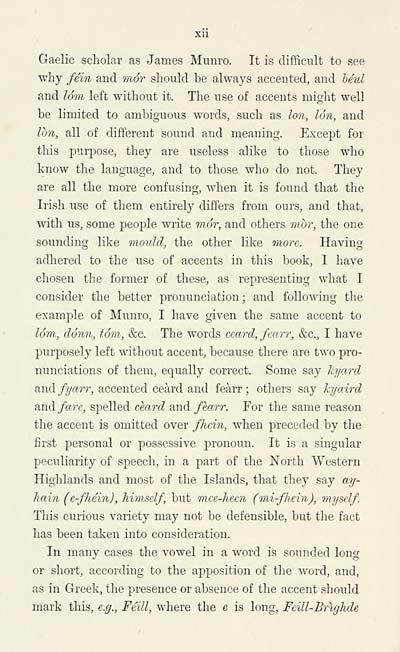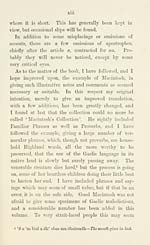Download files
Complete book:
Individual page:
Thumbnail gallery: Grid view | List view

Gaelic scholar as James Munro. It is difficult to see
why /em and mor should be always accented, and Ind
and I6m left without it. The use of accents might well
be limited to ambiguous words, such as Ion, Ion, and
Ion, all of different sound and meaning. Except for
this purpose, they are useless alike to those who
know the language, and to those who do not. They
are all the more confusing, when it is found that the
Irish use of them entirely differs from ours, and that,
with us, some people write mor, and others 7nòr, the one
sounding like mould, the other like more. Having
adhered to the use of accents in this book, I have
chosen the former of these, as representing what I
consider the better pronunciation ; and following the
example of Munro, I have given the same accent to
lorn, donn, torn, &c. The words ceard, fearr, &c., I have
purposely left without accent, because there are two pro-
nunciations of them, equally correct. Some say kyard
diiia fyarr, accented ceard and fearr; others say kyaird
and fare, spelled ceard and fearr. For the same reason
the accent is omitted over fhein, when preceded by the
first personal or possessive pronoun. It is a singular
peculiarity of speech, in a part of the North Western
Highlands and most of the Islands, that they say ay-
liain (e-fhein), himself, but mce-hcen (mi-fliein), myself
This curious variety may not be defensible, but the fact
has been taken into consideration.
In many cases the vowel in a word is sounded long
or short, according to the apposition of the word, and,
as in Greek, the presence or absence of the accent should
mark this, e.g., Feill, where the e is long, Feill-Brighde
why /em and mor should be always accented, and Ind
and I6m left without it. The use of accents might well
be limited to ambiguous words, such as Ion, Ion, and
Ion, all of different sound and meaning. Except for
this purpose, they are useless alike to those who
know the language, and to those who do not. They
are all the more confusing, when it is found that the
Irish use of them entirely differs from ours, and that,
with us, some people write mor, and others 7nòr, the one
sounding like mould, the other like more. Having
adhered to the use of accents in this book, I have
chosen the former of these, as representing what I
consider the better pronunciation ; and following the
example of Munro, I have given the same accent to
lorn, donn, torn, &c. The words ceard, fearr, &c., I have
purposely left without accent, because there are two pro-
nunciations of them, equally correct. Some say kyard
diiia fyarr, accented ceard and fearr; others say kyaird
and fare, spelled ceard and fearr. For the same reason
the accent is omitted over fhein, when preceded by the
first personal or possessive pronoun. It is a singular
peculiarity of speech, in a part of the North Western
Highlands and most of the Islands, that they say ay-
liain (e-fhein), himself, but mce-hcen (mi-fliein), myself
This curious variety may not be defensible, but the fact
has been taken into consideration.
In many cases the vowel in a word is sounded long
or short, according to the apposition of the word, and,
as in Greek, the presence or absence of the accent should
mark this, e.g., Feill, where the e is long, Feill-Brighde
Set display mode to: Large image | Transcription
Images and transcriptions on this page, including medium image downloads, may be used under the Creative Commons Attribution 4.0 International Licence unless otherwise stated. ![]()
| Early Gaelic Book Collections > Blair Collection > Collection of Gaelic proverbs and familiar phrases > (16) |
|---|
| Permanent URL | https://digital.nls.uk/76277466 |
|---|
| Description | A selection of books from a collection of more than 500 titles, mostly on religious and literary topics. Also includes some material dealing with other Celtic languages and societies. Collection created towards the end of the 19th century by Lady Evelyn Stewart Murray. |
|---|
| Description | Selected items from five 'Special and Named Printed Collections'. Includes books in Gaelic and other Celtic languages, works about the Gaels, their languages, literature, culture and history. |
|---|

